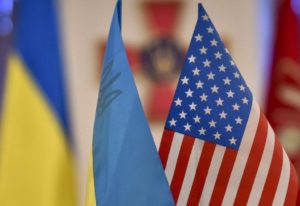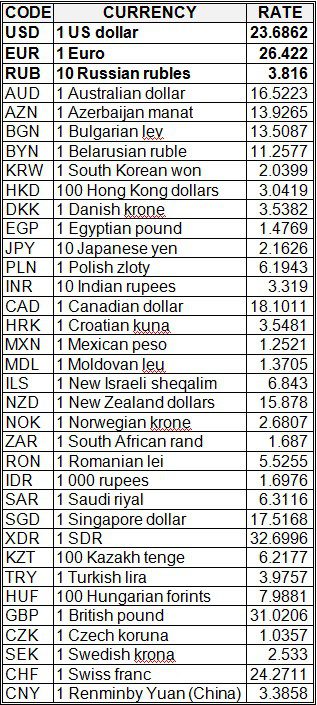
Citibank, acting as the operator of the account of the Clearstream international central securities depository (ICSD) in the depository of government securities of the National Bank of Ukraine (NBU) was first on the list of primary dealers on the government domestic loan bonds market in terms of purchase volumes made by the Finance Ministry of Ukraine. State-owned Oschadbank and Ukrgasbank are second and third. They are followed by two banks with foreign capital: OTP Bank and Raiffeisen Bank Aval.
A year ago the list differed: four state-owned banks were in the top four of primary dealers in H2 2018: PrivatBank, Oschadbank, Ukreximbank and Ukrgasbank, and OTP Bank was fifth, while Citibank was 12th, the last on the list.
The top ten of the 2019 list also includes FUIB, PrivatBank, Alfa-Bank, Ukreximbank and Kredobank, followed by bank Pivdenny and UkrSibbank.
As an ICSD headquartered in Luxembourg, Clearstream, a part of Deutsche Börse Group, on May 27, 2019 connected the Ukrainian market to its network via an account opened in the depository of the NBU and made Ukrainian securities available in its payment system.

Kristina Kvien, the deputy chief of the U.S. diplomatic mission in Ukraine, in her address to Ukrainians assured of unwavering support of the Ukrainian state by the U.S., Voice of America has reported. “I am excited to take on a new challenge and great responsibility of leading the U.S. Embassy team in Ukraine. Our policy of strong support for Ukraine remains steady,” she said. It is also currently unknown who could become the new U.S. ambassador to Ukraine. As reported, Kvien took over as U.S. Chargé d’Affaires from January 2, 2020.

The enhanced sanctions of the Russian Federation against Ukrainian goods will affect 1.3% of current exports of Ukrainian goods for January-September 2019, which in monetary terms is $31.2 million, and about 0.4% of current imports of Russian goods to Ukraine for the specified period, or $21.4 million, a source at the Ministry of Economic Development, Trade and Agriculture has told Interfax.
The largest restrictions regarding the ban on imports to Ukraine relate to the following items: boilers for central heating for $8.7 million, parts of pumps for $3.6 million, radiators for central heating with non-electric heating for $2.8 million.
The source noted that a significant part of goods that fell under the sanctions is industrial medical goods: plastic products for $6.5 million, pipes, tubes, hoses for $4.5 million, hygienic or pharmaceutical products from vulcanized rubber for $1.4 million, other products made of vulcanized rubber, except for hard, for $3.7 million.
At the same time, the ban on import to Ukraine of Russian paper and cardboard for recycling in monetary terms is estimated at $21.4 million. According to data of the State Statistics Service for the nine months of 2019, the volume of the Russian Federation in the total import of this item is 52.6%.
As for the supply of starch, in January-September 2019 this product was not exported to the Russian Federation.
“At the same time, there is a tendency to increase the use of EU tariff quotas for starch with a volume of 10,000 tonnes compared to 2016. During 2017-2019, the quota is used almost in full,” the source said.
The government of the Russian Federation by the resolution of December 16, 2019 expanded the list of goods prohibited for imports to Ukraine, supplementing it with the position “paper and cardboard for recycling.” In addition, the list of goods originating in Ukraine, which are forbidden for imports to the Russian Federation, was expanded.

Eridon firm could acquire Van Hoof Ukraine Ltd (both from Kyiv region), which specializes in the supply of equipment for poultry and pig farming.
According to materials on the website of the Antimonopoly Committee of Ukraine (AMC), the agency could allow Eridon to buy a stake in Van Hoof Ukraine, which will provide the buyer with over 50% of the voting shares on the company’s board.
Eridon is owned by Serhiy Krolevets. It distributes seeds, fertilizers, plant protection agents and is part of the Eridon group of companies. The group unites five agro-industrial enterprises, a seed plant, and a dairy farm.
According to the state register of legal entities and individual entrepreneurs, the ultimate beneficiary of Van Hoof Ukraine LLC is Ronabelo Limited (Nicosia, Cyprus).
The company operates in various areas of the agricultural sector. It supplies a full range of equipment for poultry and pig farms. It is also engaged in the supply of other new and used equipment (for the production of animal feed, tractors).
Van Hoof Ukraine LLC in 2018 received UAH 27.8 million in net profit compared to UAH 6.4 million in net loss in 2017. The company’s revenue last year increased 40% compared with 2017, to UAH 114.3 million.
National bank of Ukraine’s official rates as of 03/01/20

Source: National Bank of Ukraine